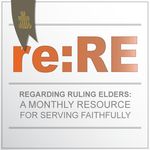The Book of Order of the Presbyterian Church (U.S.A.) provides that ruling elders serving in a church council have “responsibility for the leadership, guidance, and government of that portion of the church that is under their jurisdiction,” so that all things will result in “the peace, purity, unity, and progress of the church under the will of Christ” (G-3.0102). In pursuit of this charge, ruling elders, among other matters, are to ensure that the administration of the church and its mission are enabled and strengthened such that the church can “give effective witness in the world to God’s new creation in Jesus Christ and … the mission of the triune God” (G-3.0106).
information provided here:
Please contact Martha Miller at martha.miller@pcusa.org and browse the Ruling Elders Web site.
In ensuring that mission is properly administered, each council must “prepare and adopt a budget” (G-3.0113) and, in the case of sessions, “determine the distribution of the congregation’s benevolences” (G-3.0205). The councils are further required to ensure that “[a] full financial review of all financial books and records shall be conducted every year by a public accountant or committee of members versed in accounting procedures” (G-3.0113).
Although the Book of Order does not mandate periodic reports of all financial activities to a council other than annually, it seems inconsistent with good stewardship and oversight for the council itself not to require such reports each time it gathers for regular stated meetings. Further, the mandate that “[f]inancial books and records adequate to reflect all financial transactions shall be kept” cannot be fulfilled if the council is not reviewing those books and records on a schedule that is aligned, at minimum, with its regular stated meetings (G-3.0205b). Likewise, decisions of the mission work necessary to carry out effective witness necessitate regular review of those books and records such that the council is able to adequately and wisely fund that work.
In my experience, too often a council becomes complacent about exercising its responsibility of oversight of church finances and ends up with the difficult task of constructing and reconstructing financial books and records after fraud or theft have been detected. Such a failure on the part of a council can create great harm to the mission of the church, the credibility of the council, and the perpetrator of the fraud or theft. It is only through diligent oversight that all participants in the administration of, and accounting for, the churches financial resources remain accountable and, quite frankly, remain honest in their particular role in financial administration. With this in mind, it is important to note that the Book of Order also provides that “all offerings shall be counted and recorded by at least two duly appointed persons, or by one fidelity bonded person” (G-3.0205a).
In short, a session, or for that matter any council of the church, that does not meticulously carry out its responsibilities of oversight of the financial resources with which it has been entrusted by its members is opening the door to fraud, mismanagement, and, ultimately, great harm to the spiritual well-being of those who have breached the responsibility for maintaining good financial practices and to the entire body of Christ for whom the council has responsibility. In the end, the effective witness of the church is compromised.
Finally, it should be noted that yes, we are the church, but we are also councils of the church that cannot leave good business practices at the door of the church upon entering into God’s work and mission. In fact, we can and should bring those good practices into our work so that we are able to effectively carry out that work and witness, remembering always that we can incorporate these practices into our communal life. Thus, good business practices and the administration of mission are not mutually exclusive; rather, they are complimentary and, I would say, necessary, provided they are always tempered by the exhibition of “the love and justice of Jesus Christ” (W-4.4003i).
As ruling elders, one of the vows we take when we are to be ordained into this service is that we “[w]ill be a faithful ruling elder, watching over the people, providing for their worship, nurture, and service” (W-4.4003i). Exercising your fiduciary responsibilities of oversight in the administration of mission will better enable you, and the people in whose hands God has entrusted you, to be nurtured, to serve and to worship God in “obedience to Jesus Christ” (W-4.4003d).
Conrad M. Rocha is a ruling elder and currently serves as stated clerk and executive of the Synod of the Southwest. He is also a licensed New Mexico attorney and serves as executive director of a not-for-profit organization that provides free civil legal services to New Mexico’s poor. He has served at all council levels of the church as a volunteer, before joining the staff of the synod. He also spent 6 1/2 years as a tax accountant with what was then the largest accounting firm in the world.
This is the second article in Regarding Ruling Elders: A Monthly Series for Serving Faithfully. Look for future articles on topics such as the relationship between ruling elders and General Assembly, ruling elders as spiritual leaders, and ruling elders as meeting moderators.
Read this article in Korean. (사역 장로에 관하여: 재정적 책임 )
Respecto a los Ancianos Gobernantes: Responsabilidades Financieras

